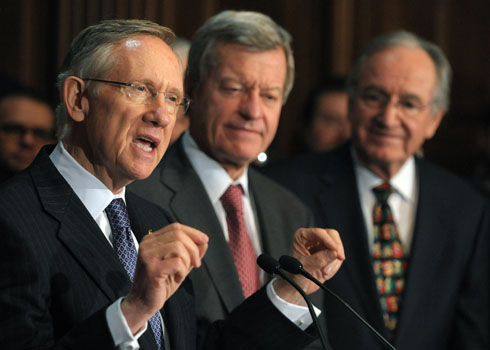Health care be on life support in the House of Representatives, but as Democrats work to revive it, some progressives see an opening to bring back an element of reform that flatlined weeks ago: The public option.
They say health care reform should pass, but only after an amending bill has been passed through the filibuster-proof reconciliation process–and that amending bill should include the public option.
The Progressive Change Campaign Committee has delivered a strategy memo to the Chiefs of Staff of all Senate Democrats outlining this course.
“The best thing Democrats could do in 2010 is fight big corporations like insurance companies and Wall Street,” the memo reads. “On health care, the path forward is obvious.”
Step 1 — The Senate passes a “reconciliation” bill with the popular public option and other budget-related fixes to the original Senate bill on issues like the national exchange and excise tax. This takes only a simple majority.
Step 2 — The House passes both the original Senate bill and final reconciliation bill back-to-back and sends them to the President.
Step 3 — A signing ceremony takes place that Democrats and voters can be proud of.
The memo cites this poll, showing that many Obama voters soured on Democrat Martha Coakley in the Massachusetts Senate race because the party hadn’t been aggressive enough in pursuing its agenda.
The idea that the Senate could work with the House on a fix bill has been floating around since before Coakley lost, but as of yet, the Senate hasn’t shown many meaningful signs of being on board.
You can read the entire memo below.
STRATEGY MEMO TO SENATE CHIEFS OF STAFF
From: Adam Green, co-founder, Progressive Change Campaign Committee — on behalf of the PCCC, Democracy for America, and Credo Action
RE: The right lesson from Massachusetts & the path forward on health care
We wanted to make sure you saw the Massachusetts Research 2000 poll, reported on by the Wall Street Journal, NBC, Politico, Huffington Post, TPM, and others.
It polled critical 2010 swing voters: the 18% of Obama voters who returned to the polls and voted for Republican Scott Brown.
* On health care, they oppose the Senate bill because it “doesn’t go far enough” and a whopping 82% support the public option.
* On the economy, by 2 to 1 they think Democrats have put special interests ahead of folks like them — and by large margins think stronger regulation of Wall Street is more important that cutting spending.
* And 57% say Democrats are not “delivering enough on the change Obama promised.”
Why did they vote for Scott Brown? They are angry and want Congress to fight on their side against entrenched power. Scott Brown pretended to be a populist, so he won.
Joe Lieberman, Evan Bayh, and Mark Penn are telling Democrats to learn exactly the wrong lesson: Slow down. Give Americans less change.
It’s not an accident that each of these men have crashed presidential campaigns into the ground. Don’t listen to them — their thinking got Democrats into this political mess. Voters want bold populism, and if Democrats don’t give it to them Republicans are ready to pretend they will.
The best thing Democrats could do in 2010 is fight big corporations like insurance companies and Wall Street. On health care, the path forward is obvious:
Step 1 — The Senate passes a “reconciliation” bill with the popular public option and other budget-related fixes to the original Senate bill on issues like the national exchange and excise tax. This takes only a simple majority.
Step 2 — The House passes both the original Senate bill and final reconciliation bill back-to-back and sends them to the President.
Step 3 — A signing ceremony takes place that Democrats and voters can be proud of.
What would this “public option through reconciliation” strategy achieve? A popular public option, 30 million new Americans insured, pre-existing conditions provisions, a national exchange that “gives people access to the same kind of plan Congress gets,” and all the other insurance industry reforms Democrats have been pushing. All without worrying about Joe Lieberman’s vote.
Plus, Democrats would be popular — for finally taking on insurance companies by passing the public option. Again, among the swing Obama voters, only 32% support the current Senate bill but 82% want a public option.
All the old arguments against using reconciliation are gone. It’s now the only way to pass a comprehensive health care bill, building off the Senate’s prior work. And once reconciliation is being used, the Senate has the votes to pass a public option.
After Massachusetts, passing the public option is a no-brainer — it’s populist, it’s good policy, and it’s what 2010 swing voters want.
That’s why in the 48 hours after the Massachusetts election, over 150,000 people signed a petition advocating the “public option in reconciliation” strategy. More are signing literally every minute, and our three organizations will deliver these signatures to you in the near future.
You can see the Massachusetts poll here and our recent national poll here.
Please feel free to reply with any feedback. And if you would like to be part of the Progressive Change Campaign Committee’s ongoing dialogue with Hill staff, please click here and let us know.
Thanks for your time.






